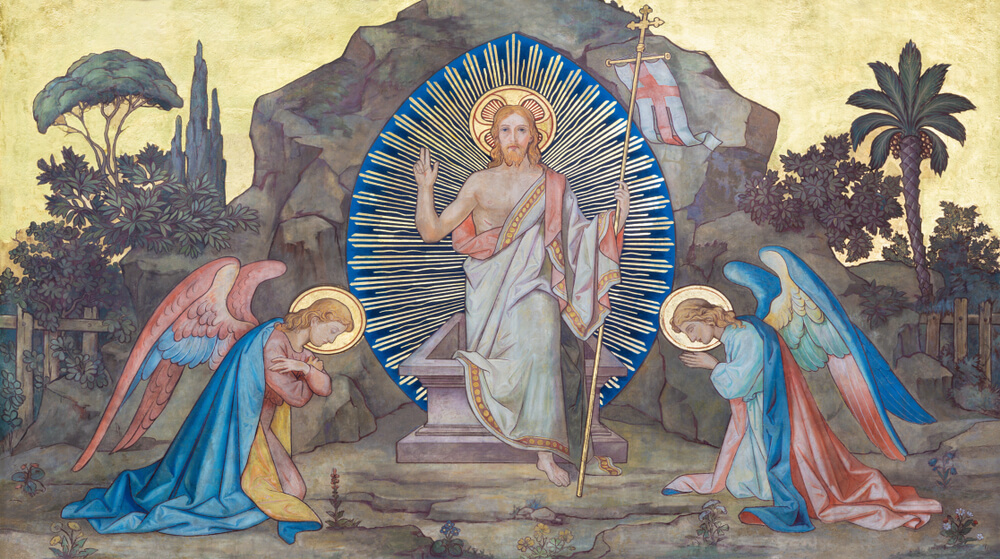The Lord is Risen! Alleluia! As Catholics, we give witness to the Resurrection of Jesus. And during this Easter season it is helpful to look back and consider those first witnesses of Christ’s Resurrection. In our time, when we say that Christ is risen, it seems like a normal, obvious thing to say. But those first witnesses had a more difficult time convincing others of the truth of the Resurrection. What can we learn from the accounts of those first witnesses? And what does their testimony mean for us today?
Steve Ray, a regular Morning Air® contributor, recently stopped by to explain what Scripture tells us about those first witnesses, and how we can relate to them in living our own witness to the Resurrection.
Steve pointed out that St. Paul’s writing in his first letter to the Corinthians lays out the case for the Resurrection, giving evidence of Jesus being raised from the dead.
He said, “First Corinthians chapter 15 is called the ‘Resurrection chapter,’ if you want to read all about the Resurrection and get a good grasp of it today. Paul starts out with the witnesses who were there. And he says that Peter saw him, and the apostles saw him, and James saw him, and 500 brethren saw him. And lastly, I saw him. But he doesn’t mention women. We know Mary Magdalene, for sure, was there before. Why isn’t she listed?”
Steve explained that at the time when St. Paul was writing, the very idea that Jesus rose from the dead was unbelievable. And so the audience Paul was writing to needed evidence of Christ’s Resurrection. In the patriarchal society in which Paul was living, the testimony of women was not seen as solid evidence, as women were not considered reliable witnesses. For those first witnesses, reliable testimony was hugely important.
“What Paul is doing is it’s almost like a trial,” Steve said. “It’s almost like a legal proceeding, where he’s explaining that you do not believe in Jesus just because you want to get to heaven. You don’t believe in Jesus because of this or that. There’s only one reason. And that is because he was raised from the dead. It’s a historical fact. And how do I know he’s risen from the dead? Because all of these witnesses saw him. And they will testify to him just as they would in a courtroom, a court of law. And the verdict is: he is risen. It’s a historical fact you must believe, and that’s why Paul writes it that way.”
The historical case for the Resurrection being a real event is an important one. Thousands of years later, we can respond to those who consider the Resurrection to be a myth, or merely symbolic, by providing historical evidence. And we have that evidence largely from the accounts of those first witnesses. But if establishing the credibility of the Resurrection was important, and the testimony of women was not considered reliable, why did Jesus choose to appear first to a woman?
Steve said, “The first one that does come and see, that we have recorded, is Mary Magdalene. She goes and tells the others, and they don’t believe her. … But she is the first of the apostles. Isn’t that amazing? The word apostle in Greek means ‘one who is sent.’ It’s as simple as that. One who is sent. That’s what an apostle is. And Mary is the first of the apostles. She is told, ‘I am sending you (‘apostle’) to go tell the apostles.’ So she is the apostle to the apostles.”
Mary Magdalene remained with Jesus all the way to the foot of the Cross. She was a witness to his death, and the first witness of his Resurrection. In the same way, as Catholics we proclaim Christ crucified. We are called to take up our cross and follow him. And we know that, like Mary Magdalene, when we share in the death of Christ we will also share in his Resurrection.
Steve also pointed out that Mary Magdalene is a model for us during this time of pandemic, when we are separated from receiving Our Lord in the Eucharist. We are in a time of waiting, just as Mary Magdalene was in the garden. During this time of hardship we can ask Mary Magdalene to pray for us, as we await our return to encountering Jesus in the sacraments.
“She’s also the waiter – the first waiter among the waiters. She was waiting, just like we’re waiting to have Communion again, to go back to Confession and all of the sacraments. How lovely that will be, because we certainly missed them!”
Listen to the full conversation below:
Morning Air can be heard weekdays from 5:00 – 8:00 a.m. Central on Relevant Radio® and the Relevant Radio App.


